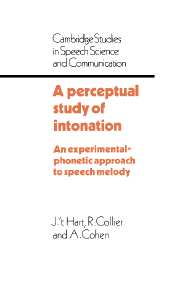3 - The IPO approach
Published online by Cambridge University Press: 04 May 2010
Summary
Introduction
As was mentioned in 2.4, and also suggested at other places, one cannot hope to establish the full relationship between the production, the acoustic manifestation and the perception of intonation at a blow. Therefore, it has been our deliberate choice to first concentrate on the study of the acoustic phenomena, and to try to develop a method of data reduction on the basis of perceptual tolerances. Data reduction in itself would already make the data more manageable, but if it is done on the basis of perceptual tolerances, it might provide us with perceptual units in a melodic description. This, in turn, might enable us to interpret these data so as to reflect how the human listener processes them. Ultimately, this may help to offer a solution to the problem of finding suitable descriptive units.
In this chapter, we will give an account of how we have tried to find such units at three different levels of the analysis of intonation. Since it seems impossible, in a phonetic approach, to establish a direct link between recordings of Fo on the one hand and the abstract mental categories of the basic intonation patterns possibly underlying them on the other, it is, in our view, necessary to make a detour. In each of the steps of this perception-guided detour, subjective similarity is at stake, from auditory identity in the first, to a more abstract kind of resemblance in the last step.
- Type
- Chapter
- Information
- A Perceptual Study of IntonationAn Experimental-Phonetic Approach to Speech Melody, pp. 38 - 67Publisher: Cambridge University PressPrint publication year: 1990

